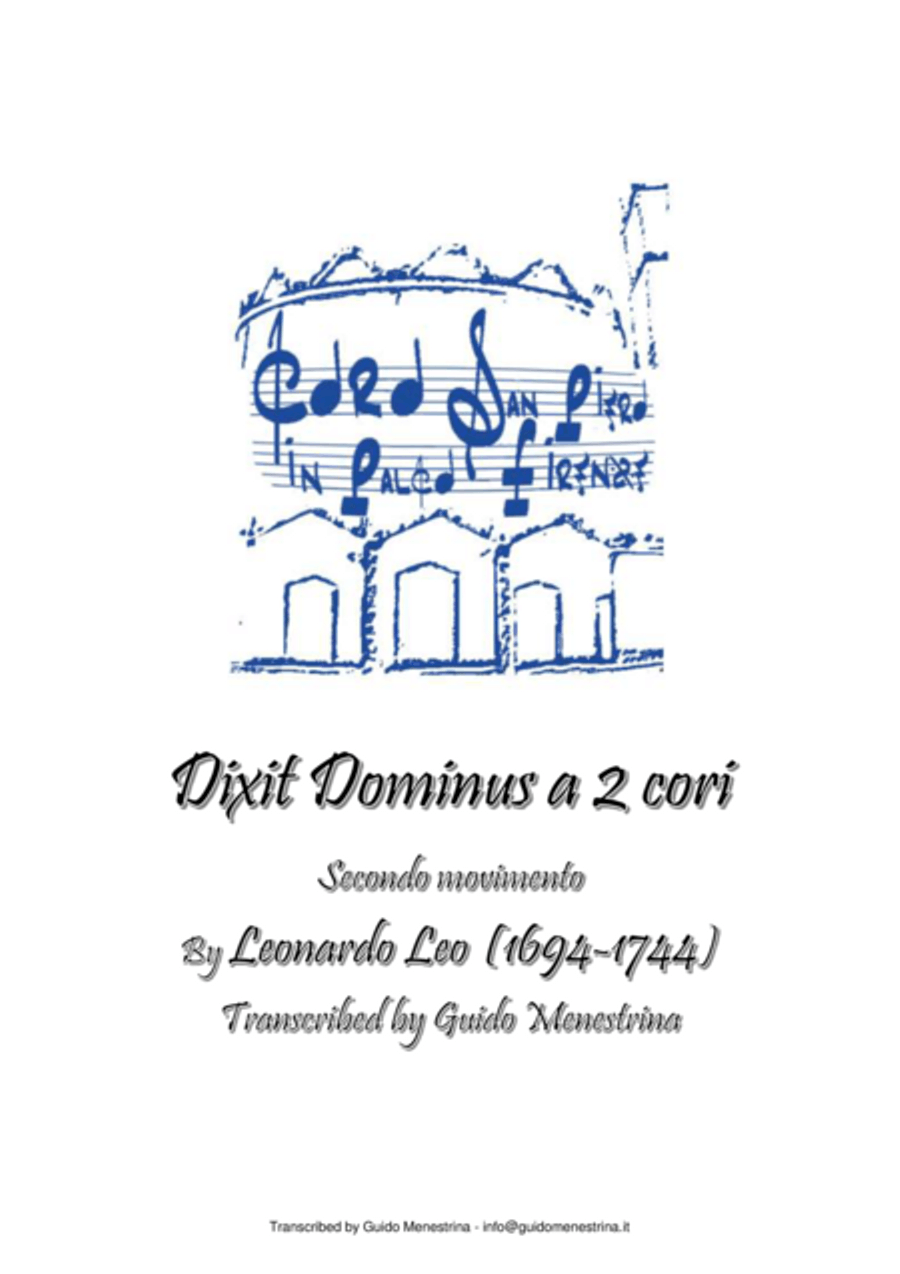Choral Choir (SATB) - Digital Download SKU: A0.828714 Composed by Leonardo Leo. Arranged by Guido Menestrina. A Cappella,Baroque,Sacred. Octavo. 23 pages. Guido Menestrina #481065. Published by Guido Menestrina (A0.828714). Leonardo Leo - Dixit Dominus a 2 cori, 1741, Secondo movimento Transcribed by Guido Menestrina Celebre compositore e capostipite della bella scuola napoletana del XVIII secolo, nacque a San Vito degli Schiavoni, presso Brindisi, in provincia di Terra d'Otranto. De Leo avrebbe compiuto i suoi studi musicali al conservatorio della Pietà dei Turchini, sotto la direzione di Nicola Fago, soprannominato il tarentino[1]. Girolamo Chigi, maestro di Cappella di San Giovanni in Laterano, allievo e amico di Pitoni, dice che de Leo si recò a Roma e che vi studiò il contrappunto sotto la guida di questo sapiente maestro. Di ritorno a Napoli, de Leo ottenne il posto di secondo maestro al conservatorio della Pietà . Nel 1716 fu nominato organista della cappella reale e l'anno successivo venne designato per occupare il posto di maestro di cappella della chiesa di Santa Maria della Solitaria, per la quale scrisse molta musica. Nel 1719 fece rappresentare la Sofonisba, sua prima opera seria che fu ben accolta e in cui il carattere espressivo del suo talento si faceva già notare. I biografi che sostengono abbia insegnato al conservatorio di Loreto s'ingannano, fu infatti prima al conservatorio della Pietà , poi a quello di Sant'Onofrio, dove ebbe per allievi alcuni dei compositori più illustri del XVIII secolo, come Jommelli e Piccinni. Non morì nel 1743, come dice lo stesso Piccinni, in una breve notizia biografica sul suo maestro, né nel 1742 come afferma Burney, ma nel 1744. Il marchese di Villarosa, riferisce che de Leo sarebbe stato colpito da apoplessia, mentre era intento a scrivere un'aria buffa de La finta frascatana che comincia con queste parole: Voi par che gite/di palo in frasca. Lo si trovò con la testa appoggiata sul suo clavicembalo e si credette, in un primo momento che dormisse, ma in realtà aveva già cessato di vivere. Leo era di taglia media, colorito bruno, occhio vivo e temperamento ardente. Sebbene fosse abitualmente piuttosto serioso, non mancava di urbanità e gentilezza. Infaticabile nella professione, passava spesso la maggior parte delle notti a comporre e si trovava sempre in vena- Amava le sue opere, ma rendeva giustizia al merito dei suoi rivali quando occorreva. Morì rimpianto da tutti, lasciando a lungo il ricordo di sé e delle sue opere, nonché della scuola di cui fu uno dei fondatori. Considerazioni sull'artista Leo condivide col suo predecessore Alessandro Scarlatti e i contemporanei Nicola Porpora, Francesco Durante e Francesco Feo, la gloria di aver fondato la scuola di Napoli, da cui sono usciti, durante tutto un secolo, una moltitudine di compositori drammatici di prim'ordine. Egli stesso fu non soltanto un grande professore, ma un artista dei più dotati. La sua musica da chiesa non ha meno maestà di quella di Durante, tocca il cuore e fa nascere degli slanci di tenera devozione. Il suo Miserere a due cori è una composizione tanto notevole per l'elevatezza dei sentimenti che l'hanno dettata, quanto per la purezza di stile in cui si riconoscono le tracce della scuola cantoria romana in cui studiò. Nella sua musica sacra nello stile accompagnato e concertato, de Leo conserva la semplicità e si fa ammirare per la bellezza dell'espressione, come l'Ave Maris Stella per voce di soprano e orchestra o il Credo a quattro. Egualmente notevole nel genere teatrale, de Leo è sempre nobile, spesso patetico e appassionato ed è con questi mezzi, molto semplici, che perviene a grandi effetti. Piccinni fa i più grandi elogi alle sue opere, e cita in particolare l'aria Misero pargoletto da Demoofonte come modello di espressione drammatica, quest'aria è, in effetti, della più grande bellezza, anche Arteaga è prodigo di elogi verso questo musicista Segui lo spartito qui/Follow the score here: https://www.youtube.com/watch?v=vqOa9skJg5o.
